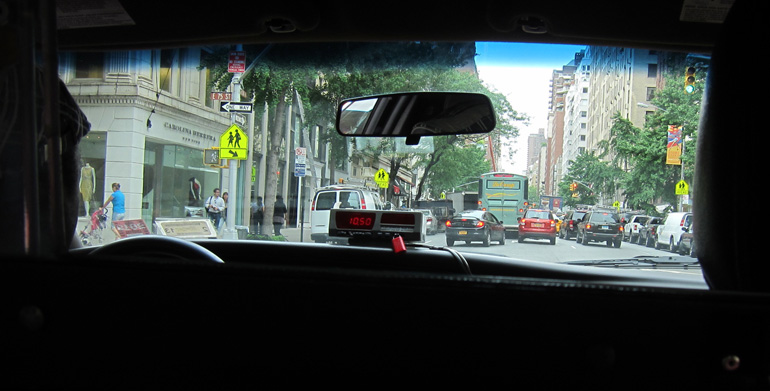Weekend Note:
Mine!
2 June 2012
Saturday
It would be wrong to claim that Will kept me on my feet for three hours yesterday. First of all, a big chunk of that time was spent in the back seat of a car, inching up Third Avenue. But even the standing and shuffling around in the blue room can’t be pinned on Will. It was really an episode of closet reorganization. It just so happened to involve nothing but his toys.
At one point, all of the toys that Will has here in our flat were sprawled across the sitting area in the blue room (as distinct from the ever-more-verboten “working area” — my writing table, my computer desk, and my Aeron chair), and I couldn’t help luxuriating in a pleasingly vague dream of Alan Hollinghurst’s despairing description of the scene. I didn’t actually write it out in my head — that would have been work — but every now a glint or angle of sharp prose would flash across my mind, leaving traces of pleasure. While Will played with this and that — at one point, he dumped all of his Plan Toys train set onto the carpet, but only in order to pack it all back into the box, everything except the little tree, which I suppose lacks the true railroading spirit of metal and motion — I kept my eye on various collections and undertook, for the first time since last summer, to gather like with like. All the crayons here. The wooden blocks there. For a long time, two of Will’s five little Volkswagens went missing. When they turned up, I tossed them into a bin, or wastebasket, that I bought at Sustainable NYC a year or so ago. It’s a clever assemblage of recycled plastic and old newspapers, and it looks great with a big beach ball in its open mouth, something like an ice-cream cone. Aside from the bin, I had two more or less presentable boxes to work with, so that the toys wouldn’t have to be tucked under furniture or in my closet. Eventually, everything fit, right about time for Kipper.
A good many of the toys are a lot older than Will. One recent tidying-up of the deeper recesses of the linen closet unearthed a stack of coloring books that went back to the late Eighties, when we kept such things on hands for our country neighbors, one of whom, last we heard, has graduated from college and is dating an Annapolis grad.
***
A dinner that could have been better; or, what a difference thirty seconds makes. The slight slab of piemontese rib-eye looked really easy to overcook, and overcooked it was; although not by much; but “overcooked” is a bad steak flavor, just as “burned” is usually bad for butter, no matter how partial the burning is. Had it been up to me, I’d have asked for a steak about half-again as thick, but that would have been too much meat for the two of us; better to learn how to cook what Agata & Valentina serves up. The sweet potatoes held our hands through the difficulties, which were not great on the steak front but emphasized overall by a new vegetable dish: celery sautéed with mushrooms.
It’s a good dish! The celery tastes like fresh, raw celery, only softer and subtler. It does not taste like the coppery death-vegetable that we knew as children from various canned products, spaghetti sauces and chop suey mostly. The recipe was Elizabeth David’s, and I’ll try it again (and again), because there are really so few green vegetables out there that a new class is desperately wanted, and celery offers real possibilities. I can’t say that the celery and the mushrooms melded, but they didn’t fight, and the garlic that was called for completely disappeared.
***
After finishing The Folding Star the other day, I wanted to listen to accordingly murky, mysterious, preferably Belgian music. I spent rather a long time looking for a recording of Schoenberg’s Pelléas et Melisande, but I couldn’t find it, so I settled for Hugo Wolf’s Spanish Song Book, as sung by Elisabeth Schwarzkopf and Dietrich Fischer-Dieskau. A long time ago, I was listening to this music in a speculative frame of mind, and the fourth song, an urgent lullabye about windy treetops, stuck in my brain forever. The other songs just sounded self-important, and I was not eager to forgive the composer for his dismissive remarks about Brahms. Perhaps for all these reasons, the songs were the perfect thing to listen to the other day, in the wake of Hollinghurst’s novel: I’d known them forever, but only in the shallowest way; I didn’t really know them at all. Clearly, it was time to assemble a playlist around them.
Every now and then I go downstairs to the music department of the Barnes & Noble just up the high street; the selection may be patchy-to-bald, but it’s always a pleasure to paw through what’s on offer, and I always buy something. The other day, it was Carmina Burana. For as long as there have been CDs, I’ve owned only one recording (James Levine’s), and one has been enough. Now that I’m in the playlist phase of music appreciation, however, plurality is indicated, so, in addition to ordering the Rafael Frühbeck de Burgos recording that I grew up with (sort of; I had one before that, but I remember none of the particulars), I bought Sir Simon Rattle’s version. I had the most unedifying thoughts whilst listening to this during the living-room tidying. It wasn’t just the bit of “Mi chiamano Mimì” that seemed derivative; the whole damned oratorio (or whatever is) seemed stolen from major motion pictures. I didn’t mind, really, but I did feel a bit soiled, knowing it as well as I did, whistling along as though I hadn’t listened to anything else for years; and seeing, or hearing, that it was all one very well-constructed kick line.
Earlier, I read “The Black Box,” Jennifer Egan’s “Twitter” story in The New Yorker. All I’ll say about it now is that, as with the PowerPoint diary in A Visit From the Goon Squad, the very excellence of the performance shows up the limitations of the form; and, as in Helen DeWitt’s Lighting Rods, we are seduced by a way of talking for a reason: so that we’ll never be seduced by it a second time. Anyone who attempts to imitate Egan’s experiment with short sentences (tweeting turns out to be entirely beside her point) will demonstrate nothing but deafness. “Black Box” is a baroque variation on themes set forth in every airline’s safety show. Incidentally, I was surprised to see that Egan’s “dissociation” techniques (for dealing with unwanted carnal intrusions) so closely matched Edward St Aubyn’s, in Never Mind, the first of the Melrose novels. You fly out of your body up to a perch from which you look down on what is happening to you. It’s too sorrowful to think much about, and it leaves me convinced that I don’t understand a thing about sex.
Sunday
In the space of several seconds, late this afternoon, I put down Elizabeth Taylor’s sixth novel, The Sleeping Beauty, and picked up her tenth, The Wedding Group. When I have done with The Wedding Group, I’ll have read all of Taylor’s novels. I thought that The Sleeping Beauty was going to break the spell; there was something about the opening chapters that I didn’t catch, or that didn’t catch me. But presently Mrs Tumulty appeared, and I was roaring. The next thing I knew, bigamy (of all things) was being contemplated.
Although there is a love story at the center of The Sleeping Beauty, a good deal of the book is taken up with other people’s doings. Very amusing is the surreptitious betting on horses that Isabella and her son Laurence indulge (each disapproving of the other’s). One of the amusements of being a novelist writing about bettors is getting to dream of names of horses. You don’t much care if Dumb Blonde or Rokeby Venus wins a race or even runs. Taylor slips in the names without warning, so that you have to be ready when Stream of Consciousness, suddenly introduced, does not mean what it usually means. At the other end of Taylor’s vast range of characters, we have a mean-spirited mother who can’t bear the company of her mentally challenged daughter. Terrible things happen in Taylor’s novels. Consider Mrs Arbuthnot, dismissed from the Claremont Hotel when she becomes incontinent, her arthritis making nocturnal visits to the loo down the hall too painful. I won’t say that Taylor makes this funny, but her retailing of Mrs Arbuthnot’s addled dreams (in which the loo can never be located) is not without comic point.
Plus: bigamy! When has that been permitted to accompany a happy ending? Â
I’ve been told that all of Taylor’s short stories, originally collected in five volumes, will be published together in the not-too-distant future. I look forward to reading all the novels again, more slowly, taking notes, and framing observations. Certainly the first of these will be that each of Taylor’s novels is a different world, artistically as well as narratively; it sometimes strikes me that each of them was the author’s first.
I’m aware that Taylor’s fiction appeals to me because I have finally arrived at the point of accepting life as it is, something I resisted with a great deal of draining energy until just about the time that I began writing online, which is either twelve or sixteen years ago, depending on how you define “writing” and “online.”
***
For dinner this evening, a ragù bolognese that I started this afternoon. It came to me as I was clearing up the breakfast things that that was what I wanted for dinner, and, even more, what I wanted to fill the apartment with the scent of. It is savory taken to the verge of sweet. Actually (looking at the time), I’d better get the water on.


